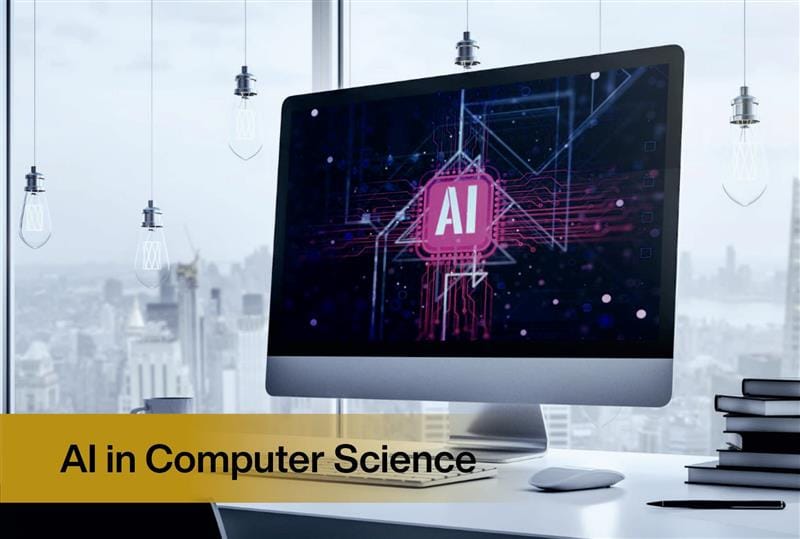The integration of AI in computer science has redefined how students approach problem-solving and innovation in technology. As industries embrace automation, data analytics, and smart algorithms, computer science AI courses prepare students for a future where artificial intelligence (AI) drives every aspect of digital transformation and intelligent systems.
Why AI is Essential in Computer Science
AI has become a foundational component of modern computing. Students pursuing computer science AI courses gain the ability to design intelligent systems that learn, adapt, and improve with data. Understanding AI in computer science is crucial for anyone seeking to excel in domains such as robotics, natural language processing, or cybersecurity.
Impact of AI on Modern Tech Careers
The growing demand for AI specialists has led to an evolution in the AI curriculum for computer science students. Employers now prioritise graduates who can apply machine learning in CS and solve real-world challenges through intelligent automation. This trend makes artificial intelligence courses an indispensable part of future tech education.
Core Technical Skills Gained in AI Courses
Students develop a robust foundation in programming for AI, data handling, and algorithmic logic. These skills help them build intelligent models and scalable AI applications. The skills gained from AI in CS courses extend beyond coding to include analytical thinking, innovation, and collaborative development for data-driven decision-making.
Programming and Algorithm Foundations
The initial phase of an AI course syllabus focuses on programming languages such as Python, Java, and R. Through these languages, students learn how to write AI-based algorithms and build neural network architectures. A solid understanding of programming for AI is vital for working on predictive models and data analytics systems.
Machine Learning and Deep Learning Concepts
A key highlight of machine learning and AI courses for CS students is learning about supervised, unsupervised, and reinforcement learning techniques. Students also explore neural networks in deep learning courses, understanding how machines recognise patterns, make predictions, and continually improve their performance through iterative training.
AI Tools, Frameworks, and Platforms
Exposure to AI tools and technologies like TensorFlow, PyTorch, and Scikit-learn helps students gain practical insights into building and deploying AI systems. Understanding these platforms enables efficient experimentation and model optimisation, ensuring learners are industry-ready for technical roles in AI research and software development.
Popular AI Frameworks
Artificial intelligence courses often introduce students to frameworks that streamline model design and implementation. From TensorFlow for neural networks to OpenCV for computer vision, these tools form a core part of the AI curriculum and allow learners to create intelligent, efficient, and scalable AI applications.
Cloud Integration for AI Projects
Modern AI solutions rely on cloud computing for scalability and data storage. Data science and AI modules teach students how to integrate cloud platforms such as AWS, Google Cloud, and Azure. Cloud-based AI projects and practical skills in CS programs ensure real-world readiness for future AI deployment environments.
Hands-On Learning and Practical Projects
An essential component of AI in computer science education is experiential learning. Students work on projects involving natural language processing, image recognition, and data analytics. These AI projects and practical skills in CS programs help them apply theoretical knowledge to create real-time intelligent systems and applications.
AI Curriculum Overview for CS Students
The AI course syllabus typically covers topics such as data science, neural networks, machine learning algorithms, and AI ethics. This structured AI curriculum for computer science students ensures they develop both technical depth and a strong ethical foundation for responsible innovation in artificial intelligence.
Interdisciplinary Applications of AI
Beyond coding, data science and AI bridge computer science with domains like healthcare, finance, and education. Students learn how AI improves diagnostics, predicts market trends, and supports automation in industries. Such interdisciplinary exposure strengthens the future career prospects after the AI CS course completion.
Emerging AI Trends for CS Graduates
As the digital landscape evolves, AI specialization trends for computer science graduates include robotics, autonomous systems, natural language processing, and generative AI. Staying updated with these trends ensures that students pursuing machine learning in CS can adapt to the next wave of intelligent technology.
Career Pathways After AI in CS Courses
Graduates can explore diverse future career prospects after the AI CS course completion, such as an AI engineer, data scientist, machine learning researcher, or automation consultant. The growing dependence on AI-driven systems across industries guarantees a wide array of rewarding opportunities for qualified professionals.
High-Demand AI Jobs and Salary Insights
With expertise in AI skills for CS students, individuals can secure high-paying positions in top technology firms. Roles like machine learning engineer and data analyst offer lucrative packages, reflecting the increasing demand for professionals skilled in AI tools and technologies and automation solutions.
Higher Education and Specialization Options
Students can enhance their expertise through deep learning courses, postgraduate research, or professional certifications. Institutions like Sigma University provide advanced computer science AI courses that blend research, innovation, and industry collaboration for long-term growth in artificial intelligence and computational engineering.
Choosing the Right AI Course for Your Career
When selecting an AI course syllabus, students should prioritise accredited universities with strong research infrastructure and practical learning. Programs that emphasise data science and AI integration and project-based learning deliver better employability and technical mastery, essential for success in global AI-driven industries.
To Wrap Up: Unlock Your AI Career in CS Programs
The inclusion of AI in computer science marks a major shift in modern education, preparing students for tomorrow’s tech-driven industries. By mastering AI tools and technologies, programming, and machine learning in CS, learners can build transformative careers. The AI curriculum for computer science students at Sigma University equips graduates with the technical edge needed for the future.
Frequently Asked Questions (FAQs)
Which programming languages are taught for AI in CS?
Students learn Python, R, and Java for AI programming. These languages are vital in mastering algorithmic logic, data handling, and developing intelligent models as part of computer science AI courses.
What deep learning skills do students gain?
Through deep learning courses, students acquire skills in neural networks, image processing, and model optimisation. These concepts are key components of the AI curriculum for computer science students.
Which AI tools are used in CS programs?
Courses cover AI tools and technologies such as TensorFlow, PyTorch, and Scikit-learn, enabling students to build efficient models, automate tasks, and analyse large-scale datasets effectively.
Are hands-on AI projects part of computer science courses?
Yes, AI projects and practical skills in CS programs allow students to apply concepts through live projects in areas like natural language processing, automation, and cloud-based AI development.
What career roles can AI-trained CS students pursue?
Graduates can work as AI engineers, data scientists, or machine learning developers. These future career prospects after the AI CS course completion offer vast opportunities across tech and research industries.
How does AI in CS improve employability?
Proficiency in AI skills for CS students enhances problem-solving, analytical, and technical abilities, making graduates highly employable in industries seeking data-driven and intelligent technology professionals.
What are the emerging trends in AI specialisation for CS graduates?
AI specialisation trends for computer science graduates include automation, robotics, deep learning, and generative AI, reflecting the global shift toward advanced intelligent computing.


